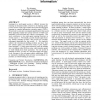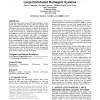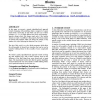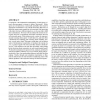ATAL
2003
Springer
14 years 4 months ago
2003
Springer
ATAL
2003
Springer
14 years 4 months ago
2003
Springer
This paper describes the implementation and evaluation of a framework for modeling emotions in complex, decision-making agents. Sponsored by U.S. Army Research Institute (ARI), th...
ATAL
2003
Springer
14 years 4 months ago
2003
Springer
Performance measurement of large distributed multiagent systems (MAS) offers challenges that must be addressed explicitly in the agent infrastructure. Performance data is widely d...
ATAL
2003
Springer
14 years 4 months ago
2003
Springer
This paper introduces a set of algorithmic modifications that improve the partitioning results obtained with ant-based clustering. Moreover, general parameter settings and a self-...
ATAL
2003
Springer
14 years 4 months ago
2003
Springer
Endowing agents with “social rationality” [10, 12, 11] can aid overall efficiency in tasks where cooperation is beneficial to system level performance. However it is difficult...
ATAL
2003
Springer
14 years 4 months ago
2003
Springer
In this paper we present a genetic algorithm-based approach towards designing self-assembling objects comprised of square smart blocks. Each edge of each block can have one of thr...
ATAL
2003
Springer
14 years 4 months ago
2003
Springer
Cooperation is the fundamental underpinning of multi-agent systems, allowing agents to interact to achieve their goals. Where agents are self-interested, or potentially unreliable...
ATAL
2003
Springer
14 years 4 months ago
2003
Springer
Decentralized control of a cooperative multi-agent system is the problem faced by multiple decision-makers that share a common set of objectives. The decision-makers may be robots...
ATAL
2003
Springer
14 years 4 months ago
2003
Springer
ATAL
2003
Springer
14 years 4 months ago
2003
Springer
There are two ways of handling bilateral multi-issue negotiations – one is to negotiate all the issues together, and the other is to negotiate them one by one. The order in whic...




